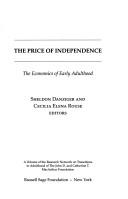| Listing 1 - 6 of 6 |
Sort by
|
Book
Year: 2007 Publisher: Cambridge, Mass. National Bureau of Economic Research
Abstract | Keywords | Export | Availability | Bookmark
 Loading...
Loading...Choose an application
- Reference Manager
- EndNote
- RefWorks (Direct export to RefWorks)

ISBN: 9780871543165 Year: 2007 Publisher: New York, N.Y. Russell Sage Foundation
Abstract | Keywords | Export | Availability | Bookmark
 Loading...
Loading...Choose an application
- Reference Manager
- EndNote
- RefWorks (Direct export to RefWorks)
Digital
Abstract | Keywords | Export | Availability | Bookmark
 Loading...
Loading...Choose an application
- Reference Manager
- EndNote
- RefWorks (Direct export to RefWorks)
Digital
Year: 2007 Publisher: Cambridge, Mass. NBER
Abstract | Keywords | Export | Availability | Bookmark
 Loading...
Loading...Choose an application
- Reference Manager
- EndNote
- RefWorks (Direct export to RefWorks)
Book
Year: 2007 Publisher: Cambridge, Mass. National Bureau of Economic Research
Abstract | Keywords | Export | Availability | Bookmark
 Loading...
Loading...Choose an application
- Reference Manager
- EndNote
- RefWorks (Direct export to RefWorks)
In the early 2000s, a highly selective university introduced a "no-loans" policy under which the loan component of financial aid awards was replaced with grants. We use this natural experiment to identify the causal effect of student debt on employment outcomes. In the standard life-cycle model, young people make optimal educational investment decisions if they are able to finance these investments by borrowing against future earnings; the presence of debt has only income effects on future decisions. We find that debt causes graduates to choose substantially higher-salary jobs and reduces the probability that students choose low-paid "public interest" jobs. We also find some evidence that debt affects students' academic decisions during college. Our estimates suggest that recent college graduates are not life-cycle agents. Two potential explanations are that young workers are credit constrained or that they are averse to holding debt. We find suggestive evidence that debt reduces students' donations to the institution in the years after they graduate and increases the likelihood that a graduate will default on a pledge made during her senior year; we argue this result is more likely consistent with credit constraints than with debt aversion.
Book
Year: 2007 Publisher: Cambridge, Mass. National Bureau of Economic Research
Abstract | Keywords | Export | Availability | Bookmark
 Loading...
Loading...Choose an application
- Reference Manager
- EndNote
- RefWorks (Direct export to RefWorks)
While numerous recent authors have studied the effects of school accountability systems on student test performance and school "gaming" of accountability incentives, there has been little attention paid to substantive changes in instructional policies and practices resulting from school accountability. The lack of research is primarily due to the unavailability of appropriate data to carry out such an analysis. This paper brings to bear new evidence from a remarkable five-year survey conducted of a census of public schools in Florida, coupled with detailed administrative data on student performance. We show that schools facing accountability pressure changed their instructional practices in meaningful ways. In addition, we present medium-run evidence of the effects of school accountability on student test scores, and find that a significant portion of these test score gains can likely be attributed to the changes in school policies and practices that we uncover in our surveys.
| Listing 1 - 6 of 6 |
Sort by
|

 Search
Search Feedback
Feedback About UniCat
About UniCat  Help
Help News
News